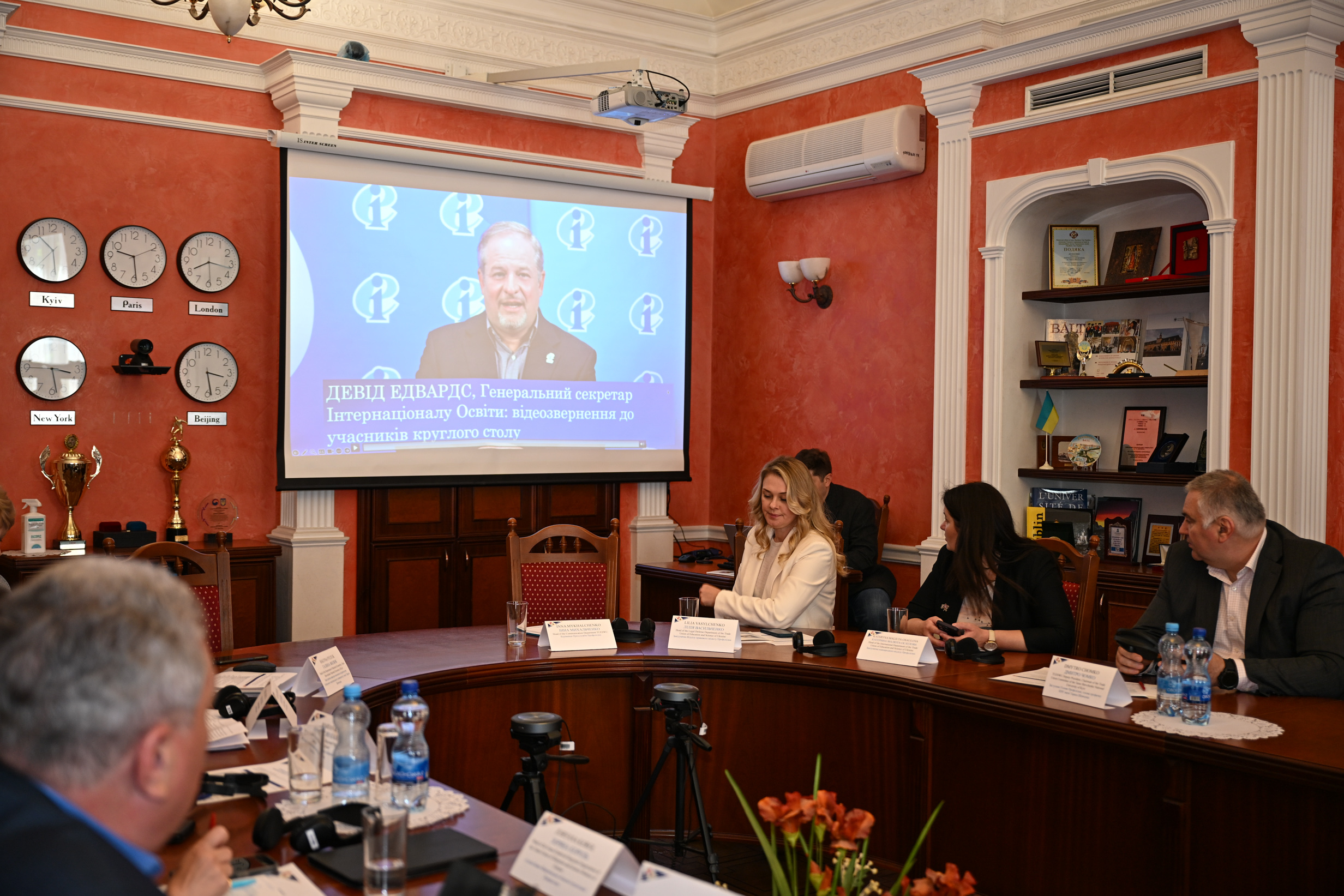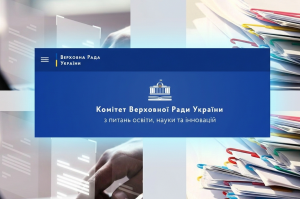Fair Pay in Education is a Key to the Development of Society and the State
 On May 12, 2025, a roundtable discussion «Fair Remuneration in Education – a Key to the Development of Society and the State» was held at Taras Shevchenko National University of Kyiv.
On May 12, 2025, a roundtable discussion «Fair Remuneration in Education – a Key to the Development of Society and the State» was held at Taras Shevchenko National University of Kyiv.
The event was initiated by the Trade Union of Education and Science Workers of Ukraine to discuss new approaches to the formation of a fair remuneration system in education.
Olha Chabaniuk, moderator of the event and Deputy President of the Trade Union, outlined the main objectives of the meeting in her opening remarks, emphasizing the importance of social dialogue and the need to unite the efforts of all stakeholders to work on updating approaches to remuneration of educators in Ukraine. She emphasized that only through joint, consistent work can effective solutions be found and the basis for fair and sustainable changes in this area be laid.
Serhii Romaniuk, Deputy President of the Trade Union of Education and Science Workers of Ukraine, presented the trade union position on compliance with legislative guarantees of teachers' remuneration. He emphasized that education should remain among the unconditional priorities of state policy, and the financial guarantees should be strictly implemented.
The situation with the level of funding for the sector is extremely alarming: with a legislatively enshrined norm of 7% of GDP for education, the state actually allocates only 4.4%. Despite understanding the challenges posed by the war, the trade union side emphasizes that postponing these issues means increasing the risks of human resources outflow, loss of teacher motivation and imbalance of the system. That is why the Trade Union insists on active social dialogue, revision of the remuneration formula and real implementation of legislative guarantees in the budget policy.
The key speaker at the event was Andreas Schleicher is Director for Education and Skills at the Organisation for Economic Co-operation and Development (OECD), who presented the experience of European countries in approaches to remuneration of teachers.
Andreas Schleicher presented a detailed analysis of the working conditions of teachers around the world. Particular attention was paid to the issue of salaries, which depends on legal regulations, purchasing power, and motivating systems. The workload of teachers was also an important topic, as teachers' responsibilities often go beyond teaching to include checking papers, preparing lessons, communicating with parents, administrative work, and mentoring.
It has been shown that education funding and the organizational conditions of the educational process have a significant impact on the quality of education. Differences in class sizes, teaching hours, and working conditions between public and private institutions further outline the challenges faced by education systems around the world. His presentation aroused keen interest and further discussion of the audience.
David Edwards, General Secretary of Education International, representing 33 million educators in 180 countries, addressed the participants of the roundtable with a video message. He expressed his deep respect for Ukrainian teachers for their resilience, courage and professionalism in times of war. He also expressed his gratitude for working in extremely difficult military conditions: online, in classrooms during alarms, in shelters or in the subway.
He emphasized that the global education community supports Ukraine and its teachers, recognizing their role in preserving and shaping the country's future. A symbol of such commitment was the example of the Minister of Education, who was recalled from the frontline to fulfill an equally important mission - to lead the educational system. He emphasized that teachers are the true architects of the future, and therefore need decent pay, proper conditions and professional support.
The current level of teachers' salaries in Ukraine does not meet these challenges, and losing teachers is a risk that the state cannot afford. A sustainable education system can only be created through an ongoing social dialogue between the government and the teaching community. David Edwards concluded his speech with words of solidarity and faith in a free, peaceful and educated Ukraine.
Representatives of the ministries of education and science, finance, and economy took part in the discussion.
Andriy Stashkiv, Deputy Minister of Education and Science of Ukraine, analyzed the problems of financing the education sector and stressed that remuneration in education is a complex system that needs to be revised and updated.
He also outlined a number of challenges that remain relevant and emphasized the need for further coordinated cooperation between the Trade Union, ministries, financiers and economists. It was proposed to move to concrete actions and create an intersectoral working group to analyze, develop and formulate effective solutions for remuneration of educators.
Roman Yermolychev, Deputy Minister of Finance of Ukraine, presented the financial aspect of the issue, emphasizing the complexity of introducing new formulas for paying teachers. He detailed that the process of reforming remuneration requires a comprehensive approach, as it is associated not only with budgetary constraints, but also with the need to adjust macroeconomic indicators that determine the financial stability of the country. In addition, Roman Yermolychev noted that in order to implement effective changes, it is important to ensure a balance between the necessary increases in payments to educators and the limited resources of the state budget, which imposes additional requirements for cooperation between the Ministries of Education, Finance and other stakeholders.
Oleh Hnatiuk, Director of the Labor Department of the Ministry of Economy of Ukraine, presented the state's vision of the formation of the subsistence minimum and improvement of the labor remuneration system.
Volodymyr Buhrov, Rector of Taras Shevchenko National University of Kyiv, presented the perspective of the academic community on the challenges and prospects in higher education. He noted that there are a number of aspects of teacher remuneration that cannot be assessed solely by quantitative indicators. The work of teachers and lecturers is not only the transfer of knowledge, but also interaction with children and students, which requires spending much time, emotional and mental resources. That is why it is necessary to take these factors into account when determining the level of remuneration, to ensure proper compensation for all the contributions of educators and to value their work as a fundamental component of quality education.
Natalia Pipa, Member of Parliament of Ukraine, actively joined the discussion, focusing on the need for legislative regulation of the issue. She emphasized that in order to effectively solve the problem, it is necessary to clearly define the main guidelines and deeply analyze its background. In her opinion, the experience and analytical data presented by Andreas Schleicher will become a solid basis for further legislative work. This will help to develop reasonable and balanced solutions to improve the system of remuneration of teachers in line with current challenges.
Nadiya Leshchyk, Education Ombudsman outlined a number of problematic aspects in the field of teacher remuneration, emphasizing that despite the existing challenges, teachers should clearly understand the prospects and feel supported at the state level. This is the key to their motivation, professional development, and the quality of education in the country.
Halyna Fylyuk, Head of the Department of Business Economics at Taras Shevchenko National University of Kyiv, said: «Where a teacher loses, the enemy wins,» emphasizing that education should be a priority in the country's economic development strategy. She stressed the need for changes in the system of remuneration for teachers to ensure the future and proper support of the teaching profession.
Participants of the discussion:
- Serhii Pugachov, Deputy Chairman of the Trade Union, Chairman of the Vinnytsia Regional Committee;
- Dmytro Chomko, Deputy Chairman of the Trade Union, Chairman of the Trade Union Committee of the Taras Shevchenko National University of Kyiv;
- Liubov Garbarenko, Deputy Chairman of the Trade Union;
- Serhii Kozoroh, Chairman of the Dnipro Regional Organization of the Trade Union;
- Zoryana Korol, Chairman of the Ivano-Frankivsk Regional Organization of the Trade Union;
- Marian Kalyn, Deputy Head of the Lviv Regional Organization of the Trade Union.
During the discussion, representatives from different regions shared the real challenges faced by education at the local level. In particular, Serhiy Kozorog from Dnipro, which is a frontline area, emphasized the particular difficulties related to staffing schools in wartime.
At the same time, even in relatively safer regions, such as Vinnytsia, Ivano-Frankivsk, and Lviv, there is still a shortage of teachers. On the eve of the new school year, schools are actively looking for professionals, as quality education is impossible without a sufficient number of professional and motivated teachers.
The heads of the regional organizations emphasized the need for a holistic approach to the reform of remuneration in education, taking into account both Ukrainian realities and international experience. In the context of the war and the staffing crisis, decent salaries for teachers are not only a matter of social justice, but also of preserving the educational system as a whole.
In conclusion, the main outcomes and prospects for further cooperation to develop a new concept for reforming the remuneration system in education were outlined.
For information:
The roundtable was held within the framework of the trade union partnership between the Trade Union of Education and Science Workers of Ukraine and the German Education Union (GEW), with the support of the German Federal Ministry of Economics and Development (BMZ) and the Sequa organization. The project was launched in January 2025 in Berlin, with a Ukrainian presentation held on March 14 in Kyiv. One of the key areas is the development of a new model of remuneration and working conditions in education, which should become the basis for further changes in the sector.
International Department

















 Пенсії проіндексовано на 12,1%: перерахунок відбувся автоматично
Пенсії проіндексовано на 12,1%: перерахунок відбувся автоматично















